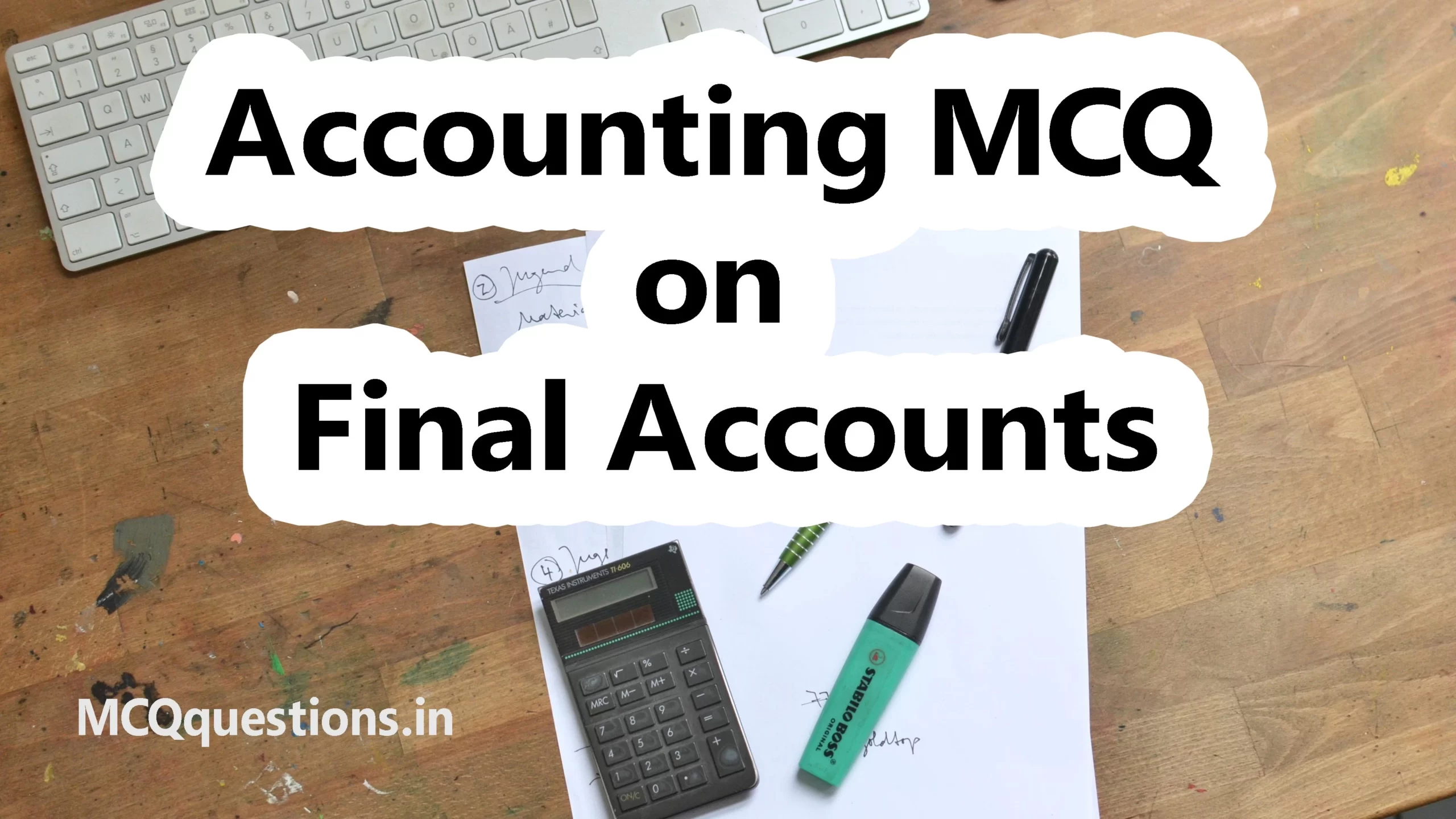Accounting MCQ on Final Accounts

You can also read all Commerce MCQ
1. Land and Building owned by a firm should be classified as:
(a) Fixed Assets
(b) Current Assets
(c) Fictitious Assets
(d) None of the above
Ans. (a) Fixed Assets
2. The profit on sale of old furniture should be credited to:
(a) Trading Account
(b) Profit and Loss Account
(c) Manufacturing Account
(d) All of the above
Ans. (b) Profit and Loss Account
3. Carriage inwards is shown on:
(a) Debit side of Trading Account
(b) Debit side of Profit and Loss Account
(c) Assets side of the Balance Sheet
(d) Liabilities side of the Balance Sheet
Ans. (a) Debit side of Trading Account
4. Income tax paid by a sole trader on his business income should be:
(a) Credited to his capital Account
(b) Credited to Trading Account
(c) Debited to Profit and Loss Account
(d) Debited to Capital Account
And. (c) Debited to Profit and Loss Account
5. Returns Outward is deducted from:
(a) Sales
(b)Net Profit
(c) Capital
(d) Purchases
Ans. (d) Purchases
6. Trading Account reveals:
(a) Financial Position
(b) Gross Profit or Gross Loss
(c) Net Profit
(d) Appropriation of Profit
Ans. (b) Gross Profit or Gross Loss
7. An example of intangible asset is:
(a) Machinery
(b) Prepaid Insurance
(c) Mine
(d) Copyrights
Ans. (d) Copyrights
8. An example of fictitious asset is:
(a) Patent right
(b) Preliminary Expenses
(c) Furniture
(d) Investment
Ans. (b) Preliminary Expenses
9. Goodwill is:
(a) Current Asset
(b) Liquid Asset
(c) Intangible Asset
(d) Fictitious Asset
Ans .(c) Intangible Asset
10. Profit and Loss Account reveals:
(a) Gross Profit
(b) Net Profit or Net Loss
(c) Financial position
(d) Cash in Hand
Ans. (b) Net Profit or Net Loss
11. Balance Sheet of a firm shows:
(a) Gross Profit
(b) Sales made during the year
(c) Financial position
(d) Units produced during the year
Ans. (c) Financial position
12. Out of the following, the one which is the most liquid asset, is:
(a) Sundry Debtors
(b) Inventory
(c) Prepaid Insurance
(d) Cash
Ans. (d) Cash
13. Manufacturing Account reveals:
(a) Financial position
(b) Cost of Production
(c) Gross profit
(d) Net profit
Ans. (b) Cost of Production
14. Trade mark is a/an:
(a) Fictitious asset
(b) Intangible asset
(c) Current asset
(d) Liquid asset
Ans. (b) Intangible asset
15. Outstanding rent is a:
(a) Representative Personal Account
(b) Real Account
(c) Nominal Account
(d) Personal Account Balance Sheet reveals:
Ans. (a) Representative Personal Account
16. Balance Sheet reveals:
(a) Cost of production
(b) Gross profit
(c) Financial position
(d) Net profit
Ans. (c) Financial position
17. Selling and Administrative Expenses are shown in:
(a) Profit and Loss Account
(b) Trading Account
(c) Manufacturing Account
(d) Balance Sheet
Ans. (a) Profit and Loss Account
18. Which of the following is an intangible asset?
(a)Stock-in-trade
(b)Building
(c) Patents
(d) Bank Balance
Ans. (c) Patents
- Which of the following is a current asset?
(a)Land
(b)Cash at Bank
(c) Goodwill
(d) Plant and Machinery
Ans.(b) Cash at Bank
20. Direct expenses are shown in:
(a) Balance Sheet
(b) Profit and Loss Account
(c) Trading Account
(d) All of the above
Ans. (c) Trading Account
21. Which of the following is an example of current liabilities?
(a) Bank Loan
(b) Debentures
(c) Creditors
(d) Owner’s Capital
Ans. (c) Creditors
22. It is necessary to make a distinction between capital and revenue items because:
(a) It is helpful to assess financial position
(b) It is helpful in calculating true profit or loss
(c) It is required by accounting principles
(d)All of the above
Ans. (d) All of the above
23. Expenditure of installation of a new machinery, is:
(a) Capital expenditure
(b) Revenue expenditure:
(c) Deferred Revenue expenditure
(d) Recurring expenditure
Ans. (a) Capital expenditure
24. Heavy advertisement expenditure is an example of:
(a) Revenue Expenditure
(b) Capital Expenditure
(c) Deferred Revenue Expenditure
(d) All of the above
Ans. (c) Deferred Revenue Expenditure
25. Which of the following is not a revenue receipt?
(a) Discount received
(b) Sales made
(c) Sale of Plant
(d) Commission
Ans. (b) Sale of Plant
26. Which liability is not shown in Balance Sheet?
(a) Contingent Liability
(b) Current Liability
(c) Long-term Liability
(d) None of the above
Ans. (a) Contingent Liability
27. Which of the following is not deducted from capital?
(a) Loss
(b) Drawings
(c) Loan
(d) Income Tax
Ans. (c) Loan